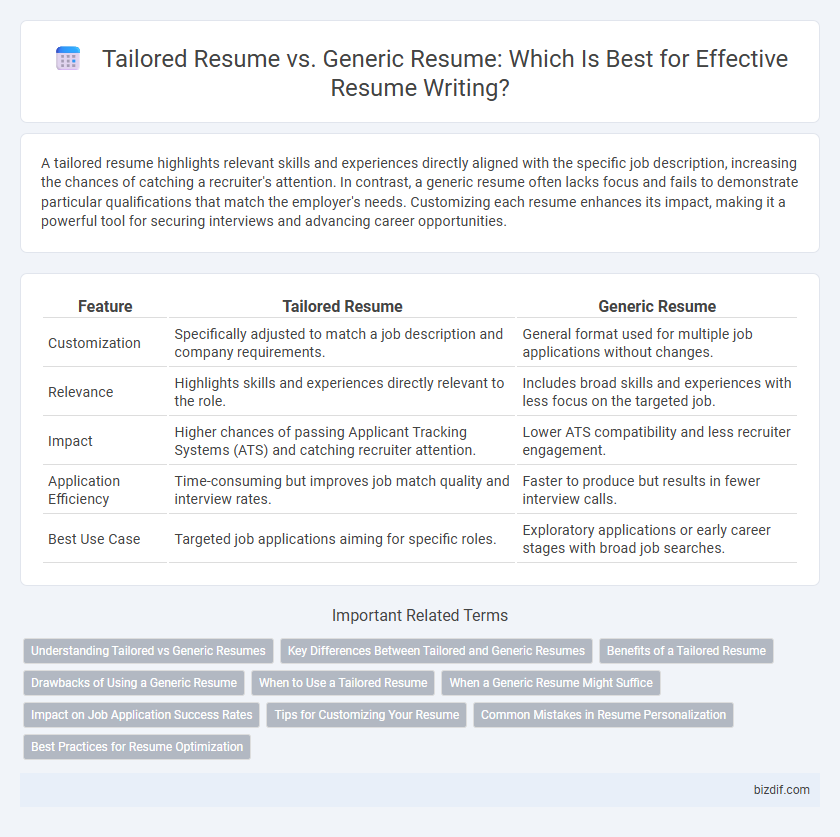A tailored resume highlights relevant skills and experiences directly aligned with the specific job description, increasing the chances of catching a recruiter's attention. In contrast, a generic resume often lacks focus and fails to demonstrate particular qualifications that match the employer's needs. Customizing each resume enhances its impact, making it a powerful tool for securing interviews and advancing career opportunities.
Table of Comparison
| Feature | Tailored Resume | Generic Resume |
|---|---|---|
| Customization | Specifically adjusted to match a job description and company requirements. | General format used for multiple job applications without changes. |
| Relevance | Highlights skills and experiences directly relevant to the role. | Includes broad skills and experiences with less focus on the targeted job. |
| Impact | Higher chances of passing Applicant Tracking Systems (ATS) and catching recruiter attention. | Lower ATS compatibility and less recruiter engagement. |
| Application Efficiency | Time-consuming but improves job match quality and interview rates. | Faster to produce but results in fewer interview calls. |
| Best Use Case | Targeted job applications aiming for specific roles. | Exploratory applications or early career stages with broad job searches. |
Understanding Tailored vs Generic Resumes
Tailored resumes are specifically customized to match the job description by highlighting relevant skills, experiences, and keywords important to the employer, increasing the chances of passing applicant tracking systems (ATS). Generic resumes present a broad overview of qualifications without emphasizing specific job requirements, which often results in lower engagement from hiring managers. Understanding the clear distinction between tailored and generic resumes is crucial for job seekers aiming to improve interview rates and career opportunities.
Key Differences Between Tailored and Generic Resumes
Tailored resumes are customized for each job application, highlighting relevant skills, experiences, and keywords that match the specific job description, increasing the chances of passing Applicant Tracking Systems (ATS). Generic resumes, by contrast, present a broad overview of skills and work history without adaptation, often resulting in lower engagement from recruiters due to lack of focus. Key differences include targeted content, keyword optimization, and alignment with job requirements, which make tailored resumes more effective in securing interviews.
Benefits of a Tailored Resume
A tailored resume significantly increases the chances of passing Applicant Tracking Systems by incorporating relevant keywords and job-specific skills. It highlights accomplishments and experiences directly aligned with the role, making candidates stand out to hiring managers. This focused approach enhances the overall impact and effectiveness of the application, leading to higher interview rates.
Drawbacks of Using a Generic Resume
Using a generic resume can hinder job seekers by failing to highlight relevant skills and experiences tailored to specific job descriptions, reducing the chances of passing applicant tracking systems (ATS). Employers often overlook generic resumes as they do not demonstrate a clear understanding of the company's needs or role requirements. This lack of customization limits interview opportunities and decreases overall competitiveness in the job market.
When to Use a Tailored Resume
A tailored resume is essential when applying for specific job opportunities, as it highlights relevant skills, experiences, and keywords that match the job description. Recruiters and Applicant Tracking Systems (ATS) prioritize resumes customized to the role, increasing the chances of passing initial screenings. Using a generic resume may be suitable for general applications, but tailoring your resume significantly improves your visibility and alignment with employer expectations.
When a Generic Resume Might Suffice
A generic resume might suffice when applying for multiple entry-level positions within the same industry, allowing for broader job search efficiency without sacrificing key qualifications. In fields with standardized requirements, such as retail or customer service, a well-crafted generic resume can effectively highlight transferable skills and relevant experience. This approach saves time while still presenting a cohesive professional profile suitable for various employers.
Impact on Job Application Success Rates
Tailored resumes increase job application success rates by aligning skills and experiences with specific job descriptions, making candidates more attractive to employers and applicant tracking systems (ATS). Studies show tailored resumes boost interview callback rates by up to 50% compared to generic resumes that lack customization and relevance. Emphasizing keywords, relevant accomplishments, and targeted industry jargon significantly enhances visibility and appeal in competitive job markets.
Tips for Customizing Your Resume
Customize your resume by aligning your skills and experiences with the specific job description, using keywords and phrases directly from the posting to pass applicant tracking systems (ATS). Highlight relevant accomplishments and tailor the format to emphasize the most pertinent qualifications for the role. Regularly update your resume for each application to increase the chances of catching recruiters' attention and securing interviews.
Common Mistakes in Resume Personalization
Common mistakes in resume personalization include using a generic resume for all job applications, which fails to highlight relevant skills and experience specific to the position or industry. Over-personalization by adding excessive, irrelevant details can dilute the impact of key qualifications and confuse ATS (Applicant Tracking Systems). Neglecting to incorporate targeted keywords and quantifiable achievements reduces the resume's effectiveness in passing automated screenings and catching recruiters' attention.
Best Practices for Resume Optimization
Tailored resumes significantly enhance job candidacy by targeting specific keywords and skills from the job description, increasing applicant tracking system (ATS) compatibility and recruiter appeal. Incorporating quantifiable achievements and industry-specific terminology optimizes the resume for both human readers and automated screening tools. Using a generic resume decreases the likelihood of passing initial screenings, reducing interview opportunities and overall job search effectiveness.
Tailored resume vs Generic resume Infographic

 bizdif.com
bizdif.com